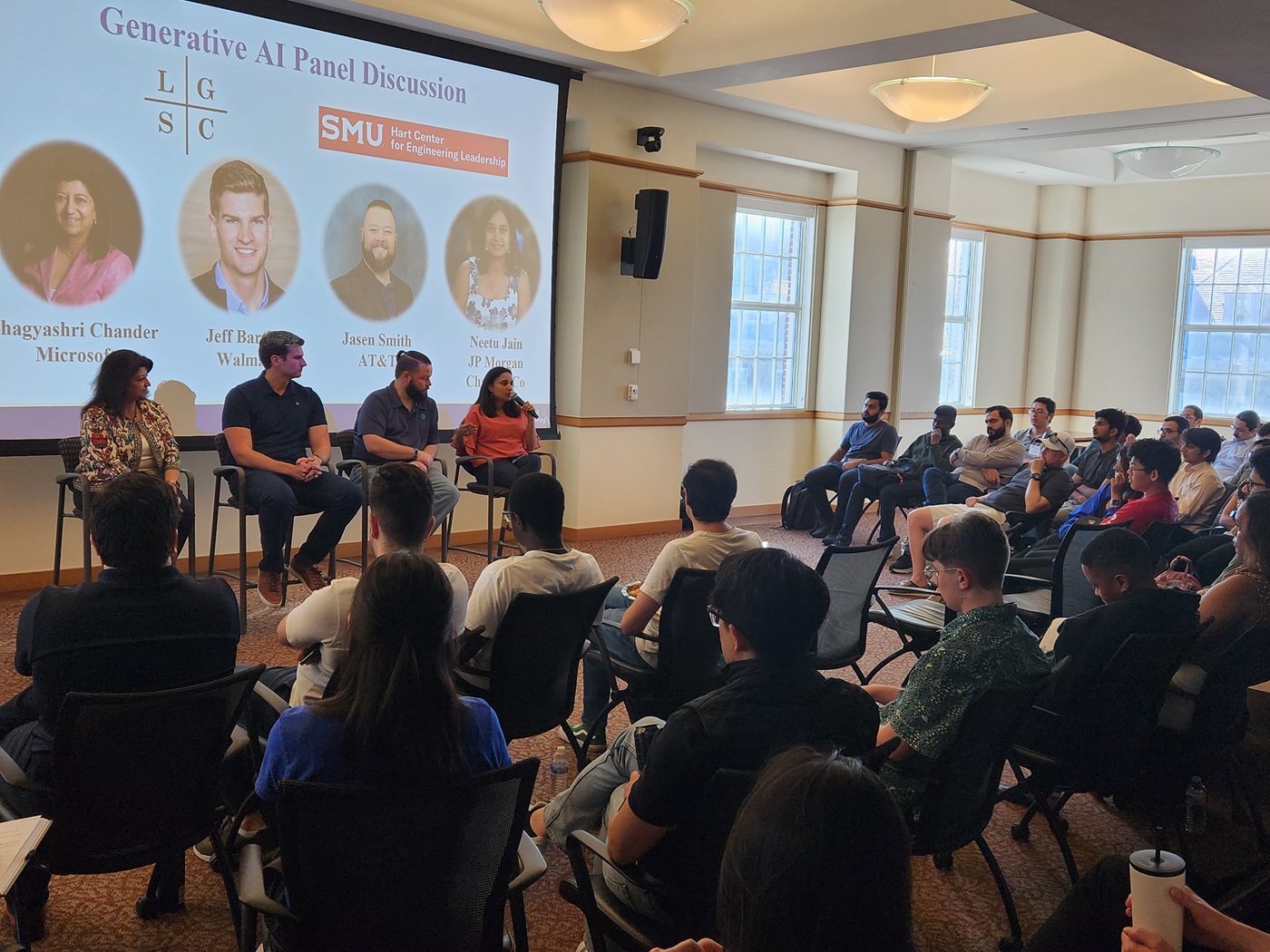6 Things the Future Workforce Should Know About Generative AI
The SMU Hart Center for Engineering Leadership hosted an expert panel of speakers on the impact of generative AI and the role of engineering leaders in this space. Read the top takeaways from their advice to SMU Lyle students.

From Grammarly to ChatGPT, most college students have dabbled in generative AI tools to help them accomplish tasks or save time studying. They’re also outpacing their professors in adopting the technology.
On the verge of entering a workforce where generative AI may be ubiquitous moving forward, SMU Lyle students attended an expert panel hosted by The SMU Hart Center for Engineering Leadership on the impact of the technology and the role of engineering leaders in this space. Speakers covered a range of topics, including content discovery, creation, authenticity, regulations, automation of human work, customer and employee experiences, and more.
The panel included:
- Bhagyashri Chander – Director, Account Technology Strategist at Microsoft
- Jeff Bartlett – Principal Product Manager of My Assistant GenAI Virtual Assistant at Walmart
- Jasen Smith – Director, Advanced Analytics for Generative AI Strategy at AT&T
- Neetu Jain – Executive Director, Product Management at JPMorgan Chase & Co
"Students are the next generation to drive the value of generative AI, so we thought it would be valuable to bring them together with experts who can go beyond the hype and share the latest trends and insights shaping the future of this technology,” said Robert Amponsah, Strategic Initiatives Director of Lyle School of Engineering.
Here are six key takeaways from the advice panel experts shared with SMU Lyle students:
Use generative AI to take mundane tasks out of work.
“For the longest time, we had to understand the bits and bytes of the computer’s language in order to communicate with it – but those days are now gone,” said Chander. “That ability has been democratized. For the first time, computers have to understand how we talk. In the workplace, I see this helping us get through grunt work so that we can focus on higher priority tasks.
“For example, I recently used generative AI to help me sort through 135 emails when I returned from vacation, simply by asking it to prioritize items from key people and to find emails where my name was used.”
Make a habit of continuous learning and upskilling.
“Blending business problems with technology solutions is the future,” said Smith. “You must continuously learn in order to solve these problems.
“And while employers are looking for a strong foundation in technology, having the ability to communicate well can set you apart from your peers. Being able to explain complex technical ideas, code, solutions and architecture to a VP of Marketing in a way they can understand it will give you a competitive advantage.”
Know the tools, but always keep people at the forefront.
“Whether you’re coming from technology or business, the key is to know the tools that are at your disposal,” Bartlett said. “Start with a vision of how you want to help the customer, then work back to what the technology can do. AI is going to become a natural part of our lives – everyone will either be working on AI, using AI, or both. Generative AI will probably have a new name in 12 months! Keep your vision and outcome at the forefront. Always keep the people at the forefront.”
Use AI tools in your daily life, then share examples in job interviews.
“Start playing with AI tools now and using them to solve your own problems, even if it’s managing your own calendar,” Smith said. “Then mention those examples when you are talking to a recruiter. They will be looking for ways you have used the tools to solve a problem, even if it’s a personal one.”
Build your innovation muscle.
“When I was a student, I was focusing too much on making the code perfect,” Jain said. “It’s important to look up, see the big picture, and build your own innovation and discovery muscle. Utilize a strategic approach of understanding the pain point, connecting the dots and creating a hypothesis for pushing the envelope with out-of-box creative solutions.
“Companies are coming up with amazing solutions using AI tools. In healthcare, it’s being used to find new cures to diseases, and this can create a breakthrough for revolutionizing education in developing countries by making personalized education accessible to all. These are very complex problems to solve, and we have a chance at making a dent in them by leveraging this new era of AI.”
Don’t be afraid to experiment and fail.
“Companies will be looking for people who have functional talent with the tools,” Bartlett said. “Go build something and don’t be afraid to fail miserably. That way, you’ll learn the tradeoffs and limitations. You won’t know unless you try and then apply what you’ve learned.”
About the Bobby Lyle School of Engineering
SMU's Lyle School of Engineering thrives on innovation that transcends traditional boundaries. We strongly believe in the power of externally funded, industry-supported research to drive progress and provide exceptional students with valuable industry insights. Our mission is to lead the way in digital transformation within engineering education, all while ensuring that every student graduates as a confident leader. Founded in 1925, SMU Lyle is one of the oldest engineering schools in the Southwest, offering undergraduate and graduate programs, including master’s and doctoral degrees.
About SMU
SMU is the nationally ranked global research university in the dynamic city of Dallas. SMU’s alumni, faculty and nearly 12,000 students in eight degree-granting schools demonstrate an entrepreneurial spirit as they lead change in their professions, community and the world.